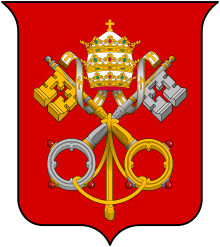Mozzetta

The mozzetta is a short elbow-length sartorial vestment, a cape that covers the shoulders and is buttoned over the frontal breast area. It is worn over the rochet or cotta as part of choir dress by some of the clergy of the Catholic Church, among them the pope, cardinals, bishops, abbots, canons and religious superiors. There used to be a small hood on the back of the mozzette of bishops and cardinals, but this was discontinued by Pope Paul VI. The hood, however, was retained in the mozzette of certain canons and abbots, and in that of the popes, often trimmed in satin, silk and or ermine material.
Colour
The colour of the mozzetta, which is always worn with a cassock and sometimes other choral vestments, represents the hierarchical rank of the person wearing it. Cardinals wear a scarlet mozzetta, while bishops and those with equivalent jurisdiction (e.g., apostolic administrators, vicars apostolic, exarchs, prefects apostolic, territorial prelates, and territorial abbots, if not bishops) wear a violet mozzetta. Rectors of basilicas and some canons wear a black mozzetta with red piping and buttons. The black mozzetta may be worn by priests who are rectors of parishes. Some religious orders have a mozzetta as part of their religious habit: the Canons Regular of the Austrian Congregation wear a violet mozzetta; their confreres in the Congregation of St. Maurice wear a red mozzetta; the Congregation of Holy Cross, the Canons Regular of the Immaculate Conception and the Lateran Canons wear a black mozzetta.
Papal mozzetta

The pope wears five versions of the mozzetta: the summer mozzetta, which is of red satin; the winter mozzetta, which is of red velvet trimmed with white ermine fur; the red serge mozzetta, which is worn during Masses for the deceased; the red clothed mozzetta, which is worn during the Lenten and Advent season; and the Paschal mozzetta, which is of white damask silk trimmed with white fur. The Paschal mozzetta is worn only during Eastertide.[1]
The winter mozzetta and the Paschal mozzetta fell into disuse during the pontificate of John Paul II (1978–2005), but their use was briefly restored by Pope Benedict XVI (2005-2013) before being discontinued again by Pope Francis. Benedict wore the winter mozzetta during the papal station at the image of the Madonna near the Spanish Steps that traditionally marks the beginning of Rome's winter season, and he wore it on all the occasions in the winter season where this garment was appropriate. The white mozzetta was reintroduced during the Octave of Easter in 2008. This change between winter and summer garments was very practical, given the oppressive heat of the Roman summer.[2]
Symbolism
The mozzetta is a sign of authority. Priests ranked as monsignors who are also pastors may wear black cassocks with matching pellegrinae, not mozzettas, both trimmed with violet buttons and piping only in their own parishes, as having attained "a touch of the purple" pertaining to the episcopal rank. Bishops wear their mozzettas of violet watered silk or a plainer fabric, with violet buttons and piping or, with less formality, black with violet buttons and piping, in their own dioceses. Cardinals may wear scarlet mozzettas of watered silk anywhere in their roles as Princes of the Church. The pope also wears his mozzetta anywhere in the world, usually with a heavily embroidered red stole over it, as a sign of his universal sovereignty.
On the evening of his election in 2013, Pope Francis did not wear the mozzetta, appearing on the balcony of St Peter's in a white papal soutane, surmounted by the pellegrina. He donned the broad scarlet papal stole only when bestowing the blessing "urbi et orbi".
Pellegrina
A shoulder cape, elbow-length like the mozzetta but open in front, is sometimes worn with the cassock, either fixed to it or detachable. It is known as a pellegrina. It differs from the mozzetta also in not being associated with a cotta, surplice or rochet.
The general rule of the Roman Catholic Church is that cardinals and bishops may wear a pellegrina with their cassocks.[3] In 1850, the year in which he restored the Catholic hierarchy in England and Wales, Pope Pius IX was understood to grant to all priests there the privilege of wearing a replica in black of his own white cassock with pellegrina.[4] Since then, the wearing of a cassock with pellegrina has been a sign of a Catholic priest in England and Wales, Scotland, Ireland, Australia, and New Zealand.
Gallery
-

Blessed Álvaro del Portillo wearing a black cassock with pellegrina, piped in amaranth.
-

Three bishops wearing a violet mozzetta.
Notes
- ↑ "Sammlung Philippi - The Mozzetta of the Pope". Dieter-philippi.de. Retrieved 2013-10-15.
- ↑ McNichol, Hugh (2008-03-25). "» The White Mozzetta is back baby…Alleluia! - Blogger News Network". Bloggernews.net. Retrieved 2013-10-15.
- ↑ "Instruction on the Dress, Titles and Coats-of-Arms of Cardinals, Bishops and Lesser Prelates, 28 March 1969, 2 and 14". Fiu.edu. Retrieved 2013-10-15.
- ↑ "England & Wales 1550-1850, s.v. Clerical dress". Catholic History. 1918-11-12. Retrieved 2013-10-15.
References
 Braun, Joseph (1913). "Mozzetta". Catholic Encyclopedia. New York: Robert Appleton Company.
Braun, Joseph (1913). "Mozzetta". Catholic Encyclopedia. New York: Robert Appleton Company.
External links
| Look up mozzetta in Wiktionary, the free dictionary. |
| Wikimedia Commons has media related to Mozzettas. |
- "The Mozetta". Dappled Photos. December 8, 2005.http://www.newadvent.org/cathen/10624b.htm
- The different Mozzette of Pope Benedict XVI.
| ||||||||||||||||||||||||||||
